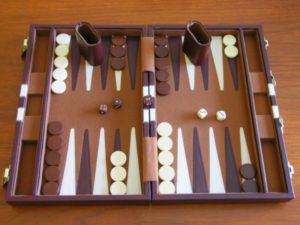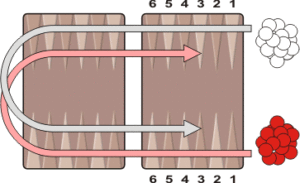Gioul – Backgammon Variant
 Setup: Each player starts with fifteen checkers on the opposing player’s one-point. The checkers move around the board in opposite directions as shown in the diagram below.
Setup: Each player starts with fifteen checkers on the opposing player’s one-point. The checkers move around the board in opposite directions as shown in the diagram below.

Object: The object of the game is to bring all of your checkers around to your own home board and then bear them off. The first player to bear off all their checkers wins the game.
To start: Each player rolls one die and the higher number goes first. That player then rolls the dice again to begin their first turn. After the first game, the winner of the previous game goes first.
Movement: The roll of the dice indicates how many points, or pips, the player is to move his checkers. The following rules apply:
- A checker may be moved only to an open point, one that is not occupied by an opposing checker.
- The numbers on the two dice constitute separate moves. For example, if a player rolls 5 and 3, he may move one checker five spaces to an open point and another checker three spaces to an open point, or he may move the one checker a total of eight spaces to an open point, but only if the intermediate point (either three or five spaces from the starting point) is also open.
No hitting: Gioul is like Moultezim in that there is no hitting in this game. One checker by itself controls a point and an opposing checker may not land or touch down there.
Doubles: A distinctive feature of Gioul is the handling of doubles. When you roll doubles, you play the number you rolled four times; then you play the next higher number in the same fashion, and so on all the way up to double 6’s. For example, if you roll 3-3, you play four 3’s, then four 4’s, then four 5’s, then four 6’s.
Unused numbers: If you cannot complete your turn, your opponent takes over, playing for himself the numbers you could not use. He starts where you left off and plays as many numbers as he can in the same order as you were required to play them. When he is finished (or has played as many of your numbers as he can), he rolls the dice to begin his own turn.
Scoring: The first player to bear off all fifteen checkers wins the game. If the losing player has borne off at least one checker, he loses only one point; otherwise he loses two points.
There is no doubling in this game.